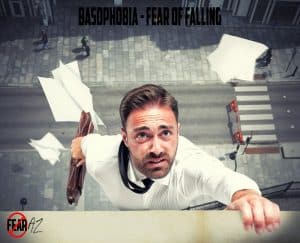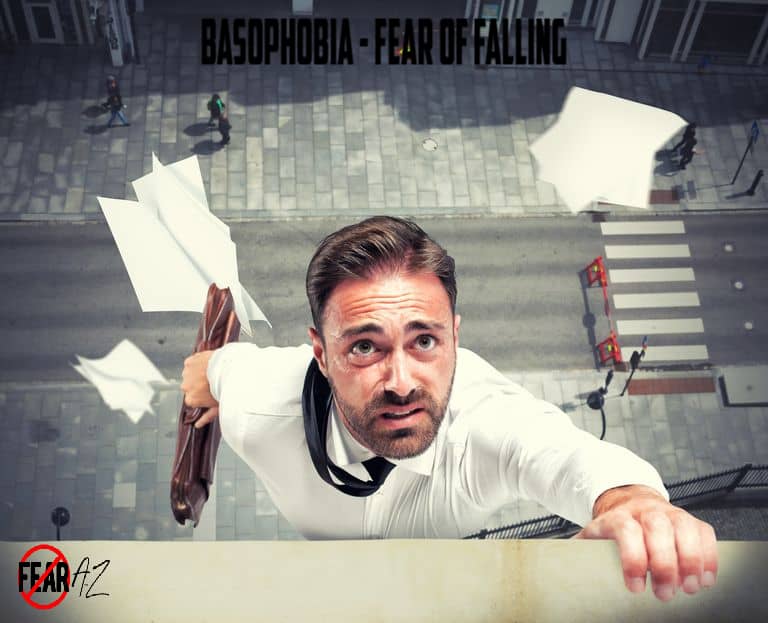Share This Article
Excessive Fear of Falling
While walking, do you have that sudden fear that you’ll fall?
Despite having a steady grip on the handrails, are you ever overcome by a fear of falling down the stairs?
The fear can be so overwhelming that you stand in place, afraid to move, or even breathe. This feeling catches you so abruptly that people around you might stare or move away in fear of your behavior.
If this sounds at all familiar, then there’s a good chance you may be battling basophobia.
Basophobia is uncommon, and even you might not know why you fear falling. Even safely on solid ground, the dread that you will fall persists. You may feel anxious or hesitant to proceed from where you stand. You might remain where you are until the fear subsides. In extreme cases, you may end up not leaving your home at all to avoid dealing with your fear in public spaces.

People around you may think that you are exaggerating. They don’t understand the terror that envelopes you when the fear strikes.
Talking about it is also challenging. How can you explain something you don’t understand? Keeping quiet about your condition could be an easy option at times.
But you don’t have to live your life like that. You can overcome your fear. You can own the hallways, stairways, and roads you walk on. Read on to learn more.
What Causes the Fear of Falling?
All phobias take root somewhere. It can be either a traumatic experience or a genetic predisposition.
In most cases, an event from childhood could cause a fear of falling from heights. The phobia sufferer might have fractured a leg, had rigorous therapy for the leg muscles, or had seen an important family figure fall down the stairs.
People who have arthritis, bursitis, and tendinitis might also develop such a fear. The pain they feel when walking makes them think they’d end up falling and getting hurt. Meanwhile, the fear of falling in the elderly might be a result of a previous falling incident. Because of what happened, they’ve lost confidence in standing up or walking.
Decoding Basophobia: Fear of Falling
Basophobia involves an extreme anxiety with losing the capacity to stand up or walk.
The fear of falling is contained to normal walking or standing up. However, any mobilization activity can activate the phobia.
Basophobia is common in older people. Meanwhile, more women than men develop the phobia.
Having basophobia can lead to a functional decline in movement and, at times, real falls.
When you have this phobia, you fear falling even if you are in a secure and safe environment. You limit your movement and reduce your activities, convinced that you will get hurt. When this is the case, your motor skills and physical wellbeing decline.
Symptoms of Basophobia
The basophobia symptoms vary, depending on the severity of the condition.
Most phobias, including the fear of falling, share similar symptoms. However, some symptoms are specific to basophobia, making basophobia easier to identify.
Individuals with basophobia might react to the object of their fear differently. But the symptoms they exhibit are typical of phobia types. These include:
Physical Symptoms
- Dry mouth
- Difficulty in breathing or shortness of breath
- Irregular heartbeat
- Rapid breathing
- Nausea and dizziness
- Shaking uncontrollably
- Sweating and chills
- Vomiting
Psychological Symptoms
- Debilitating anxiousness
- Constant thoughts of falling or being hurt
- Irritability and restlessness
- Immediate and intense fear
- Inability to express feelings
- Loss of interest to move
Depending on your fear level, you may experience few or all symptoms once the phobia is triggered.
Taking Steps to Deal with Basophobia
Basophobia can freeze you in your steps.
The fear can cause you to be less active and lose interest in moving. Don’t let your phobia reach that level of fear. If you do, you’ll waste all the great experiences and memories still to come.
Being scared is unpleasant enough. But being robbed of your mobilization would be unfair not only to you, but also to the people who want to spend time with you.
Getting the fear of falling under control is possible. But the decision to take the reins and embark on the journey to recovery depends on you.
Things You Can Do to Help Yourself
You can try many things at home to control your basophobia.
You can try breathing exercises to calm your nerves. Once you are completely calm and focused, envision yourself walking. Get comfortable with that mental picture until you do start with the physical activity.
An ideal place to do your exercises is your room or a space where you are completely at ease. Walk a few paces, then stop. Repeat the same process until you are ready to venture outside of your room. Walk to the other parts of your home; include sitting down and standing up. Go up and down stairs if you have some in your house. After the activity, tell yourself that you’re OK. No harm came to you.
With a trusted friend, walk around a single block and back to your house. Venture out two blocks and back, telling yourself while walking that you are alright. Go farther from your home if you feel like you are ready. Note that you can do this exercise at your own pace.
Start exercising. Build your strength. You’ll gain confidence in your strength and your capacity to prevent yourself from falling. Physical exercises and structured activities can improve your well-being.
One thing is certain. You won’t overcome basophobia by locking yourself in a room and becoming immobile.
Professional Basophobia Treatment
Another option that you can consider would be seeking help from a professional. Like most, you might feel uncomfortable sharing your deepest fears with a stranger. But your case, although unique, will not come as a surprise to them. Chances are, your medical providers have handled cases similar to yours.
After an initial assessment and diagnosis, you would be asked to consider a few processes and techniques to help you with your phobia. Some of the options include: physiotherapy and psychological counseling; hypnotherapy; energy therapies; and neuro-linguistic programming.
If you are currently on medication, a thorough review might be conducted to check any drug side effects which could increase your probability of falling.
With these options, you can better regulate your fear and reaction towards it.
Learning to Cope with Basophobia
Coping with basophobia is not easy. Neither is it a brief experience.
You would experience drawbacks along the way, despite going through therapy sessions and using many self-help tools. Triggers that can cause you to freeze might still emerge from time to time. But unlike before, now you’ll know how to compose yourself, give a self-reminder that you are OK, and continue moving forward.
Your journey will be a lot better if your family and friends understand and support your road to control. They can accompany you as you start walking again without fear. When the nervousness creeps in, a word of encouragement from them can make a world of difference.
Conclusion
Take control of your fear. Walking or standing doesn’t equate to falling and getting hurt. Take a deep breath and let your feet lead you to new adventures.




